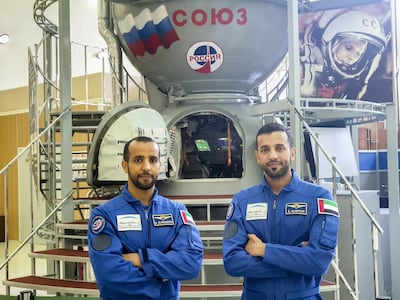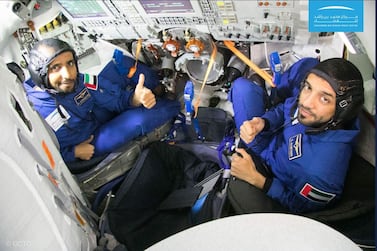The first Emirati astronaut to be propelled into space hopes to inspire a nation by hoisting the UAE flag inside the International Space Station in September.
Military pilot Hazza Al Mansouri and scientist Sultan Al Neyadi beat 4,022 other hopefuls across the country to be the first to undergo astronaut training, but only one will be selected for the eight-day journey to the ISS.
On Monday, in what felt like an audition to be the nation’s representative for the UAE’s first space mission, the two astronauts spoke publicly for the first time about their selection.
The successful astronaut will be announced in May, but until then the pair will continue their training so each is ready for the historic space mission, scheduled for launch on September 25.
Neither yet know who will be on board the Russian Soyuz rocket but both are ready and willing for the challenges ahead.
“It will be a great honour to be the first Emirati astronaut to reach the ISS,” said Mr Al Mansouri, a father of four with a bachelor's in aviation sciences from Khalifa bin Zayed Aviation College.
“I applied for the programme because I had a dream as a boy and our leaders encourage us to achieve our dreams.
“When I was told I was selected for the programme, it was difficult to express how proud and honoured I felt. I was euphoric.”
Mr Al Mansouri said his training as a military pilot served him well during the selection process, and during his recent training at the Yuri Gagarin Cosmonaut Training Centre in Zvezdini, or Star City.
At the training base, the men’s endurance under gravitational force was tested and their ability to operate in a zero-gravity environment.
They also learnt survival skills in case they should crash in a remote area of Siberia on returning to Earth.
Mr Al Neyadi, who has a bachelor's degree in information technology, a master's degree and a PhD, said destiny led him to apply for the Mohammed bin Rashid Space Centre’s astronaut programme.
“I studied people who reached the Moon at school and I was excited by the idea of becoming an astronaut,” he said.
“I thought it was a crazy idea. But in 2017, destiny took me to the first scientific event at the Mohammed bin Rashid Space Centre.
“I still thought my dream was impossible but when they launched the first programme in the UAE for astronauts I immediately applied.”
The UAE Astronaut Programme is funded by the Telecommunications Regulatory Authority and was launched in 2007. It is the first of its kind in the Arab world.
Mr Al Neyadi, 37, has a passion for science and space and a military background, so fitness and agility is second nature.

“I did not tell my parents I had applied,” he said. “I tried to keep it secret until I had passed all the medical examinations.
I had a call saying that someone would be in touch soon to tell me if I had made the programme. Those 10 minutes I waited felt like 10 years.
The chosen astronaut will perform scientific tests in the ISS laboratories, according to the timing and duration of his stay. He will also conduct research for UAE schools and universities.
Commands during take off and landing on board the Soyuz rocket will be delivered in Russian, so both men have been getting to grips with learning the language.
“All of the training was in Russian but I wanted to learn the language,” Mr Al Mansouri said.
“The Russian segment is one of the most important segments of the ISS. We must be ready and capable.”
With space a premium on board the ISS, the men are restricted to just 1.5 kilograms of belongings to take with them.
Both plan to carry a UAE flag, family photos and books. They have also adapted their diets to suit the more unusual menu of space.
“We will be experimenting with our lives,” said Mr Al Neyadi, who ate nothing but the food he will eat on board the ISS during his training in Russia.
“Beef tongue and meat with jelly were some of the meals on offer, and most astronauts have different reactions to taste in space as your sense of taste changes, as does the human body.
“In Star City, everything was strange at first. We knew the Russian winter was tough but we coped very well alongside the Russian cosmonauts.”
In October, Russia was forced to abort a Soyuz rocket mission shortly after launch due to a technical fault. Luckily both crew on board returned to Earth safely.
It was one of the few incidents to blight the Russian craft, renowned for its reliability.
Dispute the setback, Mr Al Neyadi is not deterred by the risks involved in space travel.
“Space is a tricky business and accidents can happen, but you have to trust in your knowledge and the equipment,” he said.






